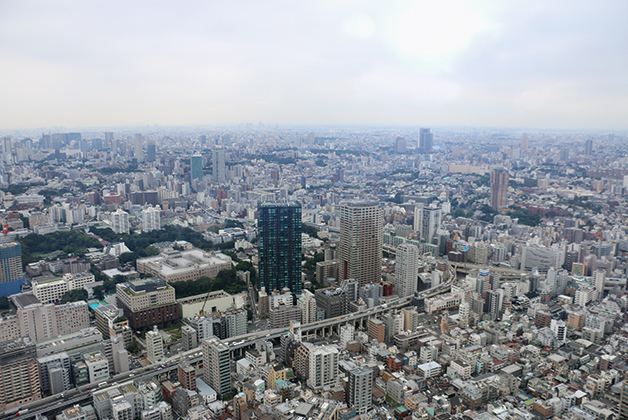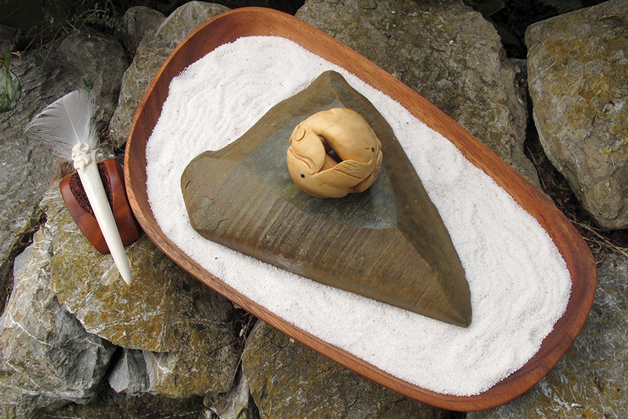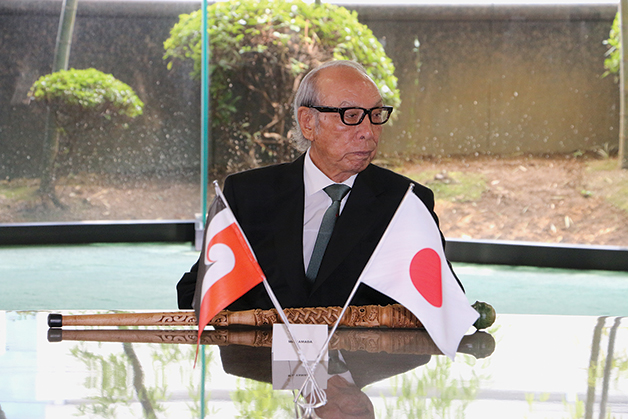A Tokyo taleWhy did a Japanese businessman and philanthropist lend millions of dollars to Ngāi Tahu?
Oct 10, 2014

Kaituhi Mark Revington reports.
The manaakitanga begins when three black vehicles pull up on the forecourt of our hotel on the edge of the Ginza district in Tokyo.
Kaiwhakahaere Tā Mark Solomon and Tā Tipene O’Regan are in Tokyo to present tokotoko and koha to Japanese businessman and philanthropist Masashi Yamada and his right-hand man, Yoshikazu Narimoto, in recognition of an important relationship shared with Ngāi Tahu.
It was Mr Yamada who, on the strength of a handshake, lent several million dollars to Ngāi Tahu at a time when the tribe was almost broke. “He made our future possible,” says Tā Tipene.
Also along on this trip is Dr Graham Kitson (Ngāi Tahu) who introduced Tā Tipene to Mr Yamada in 1989. That introduction enabled a lifeline to be extended to Ngāi Tahu. A series of loans during the 1990s that meant financial survival towards the end of the Waitangi Tribunal hearings and into the early years of negotiations with the Crown.
“What was also so crucially important was that through the relationship with Mr Yamada we effectively capitalised Ngāi Tahu Seafood, which went onto capitalise Ngāi Tahu Property. As well as the foregoing, there was an extensive provision of securities for bank guarantees which were utilised to fund particular projects and acquisitions,” says Tā Tipene.
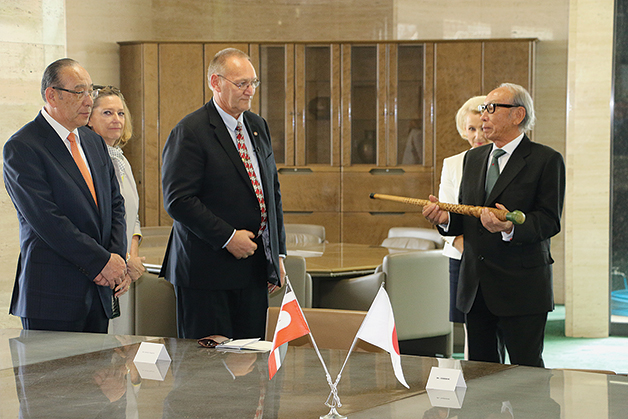
Tā Mark presents Mr Yamada with the tokotoko Tākurikuri which comes from ‘Te karaka tākurikuri o Tanē Moeha – the barking pups of Tāne Moehau’ in remembrance of the relationship between Mr Yamada and Bill Solomon.
Now Tā Tipene, Tā Mark, and Graham Kitson are honoring that relationship with the gift of two tokotoko, carved by Ngāi Tahu master carver Fayne Robinson, and a netsuke. The netsuke sculpture, symbolising Māori and Japanese traditional forms, is mounted on a stone ventifact from Tikore Island in Awarua and was carved by bone carver Brian Flintoff.
The two tokotoko were presented to Mr Yamada and Mr Narimoto in a moving ceremony at the Yamada Group’s boardroom in Shibuya, Tokyo. It was filmed along with a subsequent interview with Mr Yamada for the Ngāi Tahu Archives. The netsuke was presented to Mr Yamada at his home the following night before dinner, which included lobster to commemorate a memorable dinner of crayfish Mr Yamada had with Bill Solomon at Takahanga.
What prompted the Japanese businessman to make a loan to Ngāi Tahu? At its heart is a beautiful friendship and serendipitous timing. It becomes obvious when Mr Yamada sees Tā Tipene just what affection the pair have for each other. And after the ceremony, as photos are taken, he loops his arm through the arm of Tā Tipene and beams at the camera.
He is remarkably chipper for a 91-year-old, especially when he gets the chance to show off two hole-in-one trophies won this year. Evidently he still shoots a mean round of golf.
Also present for the ceremony is Mr Narimoto, Mr Yamada’s wife Violette, her cousin Isabell who does much of the translating, and his son Shinji, who plans a visit to New Zealand early next year.
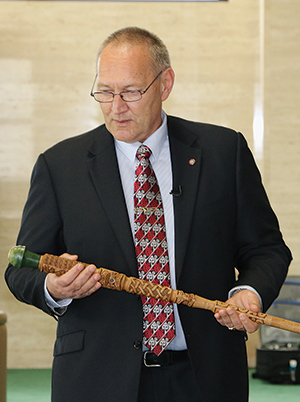
The relationship with Ngāi Tahu began when Mr Narimoto was convinced by Mrs Yoshie Yamaguchi of the Yamada Corporation to send a delegation to New Zealand in 1989 to look at possible property investments.
“Yamaguchi-san was very fond of New Zealand and had been there several times, and she convinced Narimoto-san and me to come and visit New Zealand because she thought it was a very beautiful island and that perhaps we should look into property or investments in
New Zealand. So that is how Narimoto-san and I came to New Zealand for the first time, and that is how I first met Graham Kitson,” says Mr Yamada.
The role of Mr Narimoto in developing the relationship between Mr Yamada and Ngāi Tahu is not to be underestimated.
“Narimoto-san is the source, the origin of my knowledge and my discovery of New Zealand through the introduction that Yamaguchi-san gave to Narimoto-san. If Narimoto-san had not been there, perhaps I would have never been to New Zealand and I wouldn’t have known anything related to New Zealand. Narimoto-san has been my bridge to New Zealand, as Graham Kitson has been the bridge to Japan.”
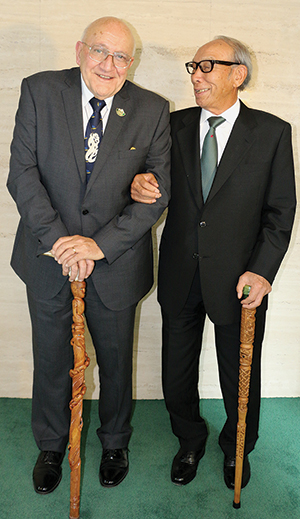
Tā Tipene and Mr Yamada.
Graham Kitson is a Christchurch-based businessman with a long-held interest in Japan. He was approached to assist with the Yamada delegation’s upcoming visit.
“In 1989 we met a group that was led by Mrs Yamaguchi and Mr Narimoto,” Graham says. “They came out in the initial party, and we spent a lot of time looking at potential resort development investment opportunities in Wānaka. The next phase was to look at an opportunity in the Marlborough Sounds, and the development of an island in the Sounds was quite attractive so the whole group shifted from Christchurch to Nelson. This was when Mr Yamada came out.” Mr Yamada recalls being pleasantly surprised being greeted in Japanese by Graham.
“I felt like I had known you for a very long time,” he said to Dr Kitson during the interview for Ngāi Tahu Archives. “And then as you recall, you showed us your dream island. On the boat on the way back, I remember we had a long conversation. We talked about fishing and you mentioned that if I was interested in investing in fishing in New Zealand, there was a wonderful person I should meet by the name of Mr O’ Regan and we started that conversation.”
It was 1989 and the Ngāi Tahu Claim was a long way from being settled, and although Graham didn’t know it at the time, the Ngāi Tahu Māori Trust Board was nearly broke. The Trust Board sold all of its assets in 1986 to fund the Waitangi Tribunal hearings, and then with the banks refusing to lend money to the Trust Board, for political reasons, according to Tā Tipene, it soon became evident that the board would not have sufficient funding to complete the process.
Although Graham [Kitson] did not know Tā Tipene at the time, he was to contact him soon after meeting Mr Yamada about forming a potential relationship with the Yamada Corporation. “Graham said he had a proposition, and I said, ‘Well, this sounds bloody good!’” … recalls Tā Tipene.
Although Graham did not know Tā Tipene at the time, he was to contact him soon after meeting Mr Yamada about forming a potential relationship with the Yamada Corporation.
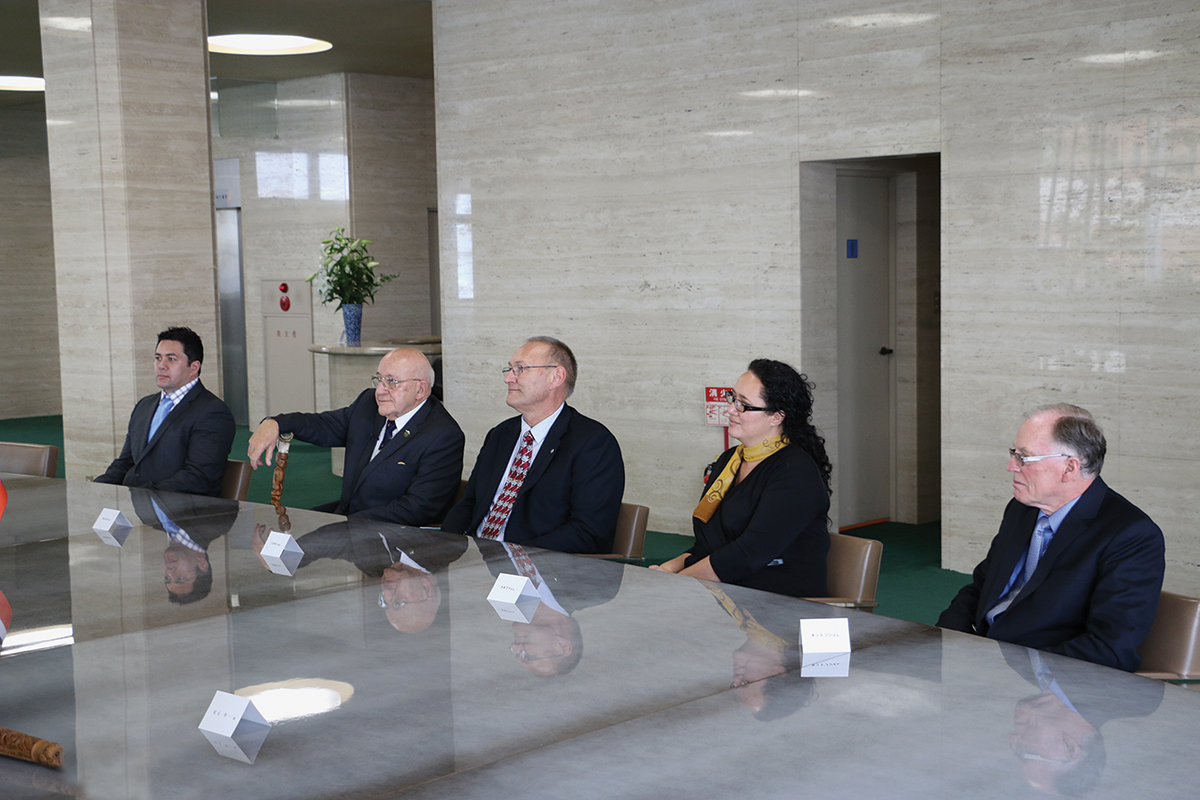
From left: archives manager Takerei Norton, Tā Tipene, Tā Mark, Te Taumatua general manager Charisma Rangipunga and Dr Graham Kitson in the boardroom of Yamada Corp in Tokyo this year.
“Graham said he had a proposition, and I said, ‘Well, this sounds bloody good!’ The next thing I remember my sister-in-law, who was my secretary at the time, came into my office with an invitation to go to Japan attached to a return business class air ticket. This was essential because we simply did not have the money for a flight to Japan! Within a few days I was flying to Japan with Graham where we were able to have our first really substantive conversation,” recalls Tā Tipene.
On arrival at their Tokyo hotel after a 12-hour flight, Tā Tipene and Graham were immediately whisked away in a chauffeur-driven car to meet with Mr Yamada.
“It all took place in a room which was like a big university seminar room absolutely full of what seemed to be young Japanese men with notebooks and suits and ties and an old man sitting in a corner. This chap was introduced to me as Yamada-san. I still didn’t know what the Yamada Corporation was made of or anything about what it did. Basically, I just went for it!” says Tā Tipene.
“I did my best to explain to them why they should come and fund this bunch of Māori from the South Island, with Graham translating everything into Japanese and me not understanding a word of Japanese. Everyone else was sitting there taking careful notes – except for Yamada-san – he just sat impassively in his chair and watched and listened.”
Mr Yamada vividly recalls this first encounter with Tā Tipene.
“When I met Mr O’ Regan, I was very taken by his passion and the way he talked about his culture and about Ngāi Tahu, and I thought he was a fantastic human being. He touched me very much. That was the trigger of my interest for the Ngāi Tahu, that very strong, passionate personality of his.
“And then I also remembered my mother’s words about how it was important to have friends all over the world, and I thought I should make this man my friend and support him. That was also part of the relationship, the human encounter.
To understand why a Japanese businessman would loan Ngāi Tahu several million dollars on the strength of a handshake, it is necessary to understand Mr Yamada’s upbringing, a point he was keen to make during the interview in Tokyo.
He was born in 1924 in Miyagi in Sendai in a town called Ishinomaki (which suffered severe damage in the 2011 tsunami) and brought up by his mother, who started a fishing company and founded what would become the Yamada Group.
“There were very few women in those days who could speak English and who were involved in business, so she was one of a kind, the first leader and first chair of Yamada Group. Thanks to trade she started to do some good business and invested the profits in real estate. This is how the real estate sector of the Yamada Group started.”
As business flourished, his mother moved to Yokohama to develop the company. Mr Yamada went to university in Tokyo where he studied property management, and on graduating moved into the family business. He helped out in administration of real estate and developed the company through four streams – trade, fisheries, real estate and leisure.
His mother was very active socially, and met a lot of people in Yokohama where she also owned a couple of restaurants. She was also a woman who cherished peace and believed that education was a good basis for peace.
“She believed that to avoid wars, people needed to be educated properly and that education was the base of peace. I was brought up with that in mind, so education was always very important.”
“I remember sharing some delicious lobster and soup, and during that dinner that Bill Solomon and I talked about the next generations and young people and how important it was to ensure that they would keep on the traditions in which they were born. He talked about it with pride and with anxiety.” Masashi Yamada
In June 1992 Mr Yamada returned to New Zealand where he gifted Ngāi Tahu a traditional Japanese noh mask which is now proudly displayed in the main Ngāi Tahu boardroom. He also had a memorable visit to Takahanga Marae.
“What I remember most was the welcome. There was something extremely warm and touching about that welcome. I felt like I was in a different world. It was like nothing I had experienced before. It is really an emotion I can’t forget.
“I do remember also that day sitting next to Bill Solomon and feeling something very special about his presence. He was very warm and I think there was something extremely wise and peaceful about him.

A hongi after the formalities of the pōwhiri at Takahanga Marae during Mr Yamada’s visit in the 1990s.
“I remember sharing some delicious lobster and soup, and during that dinner that Bill Solomon and I talked about the next generations and young people and how important it was to ensure that they would keep on the traditions in which they were born. He talked about it with pride and with anxiety. In response to that anxiety I really urged him to put a lot of focus and strength on education. And I think we shared a lot of thoughts that evening about how important it was to educate young people.”
In 1999 Tā Mark, Tā Tipene and Graham visited Japan to pay the final amount of money owing to Mr Yamada, and Bill Solomon’s impact on Mr Yamada was clearly evident when Tā Mark met Mr Yamada for the first time:
“We go up into his office and we walked in and there were three people in the room – Yamada-san, Narimoto-san, and Yamada-san’s daughter,” recalls Tā Mark. “Tipene introduced me. ‘This is Mark Solomon, the Kaiwhakahaere of Te Rūnanga o Ngāi Tahu’, and this old man then shakes my hand and says to me, ‘Are you Bill’s boy?’ ‘No I’m his nephew.’ ‘Your uncle promised to me that when I died I can be buried on Takahanga Marae. Will you honour the deal?’ I was stunned and all I could think of was, ‘How am I going to go home and tell the aunties this one!’”
Instead of accepting the final payment, Mr Yamada asked that the money be used to set up an educational fund for young Ngāi Tahu students.
“When Sir O’Regan came back to see me to repay the loan that I had given the tribe, I thought about that conversation I had with Bill about how important education was for young people, and about all that it meant to all of us, and this is why I decided to say, ‘No why don’t you keep it and let’s make a scholarship that contributes to the cause of education for the Ngāi Tahu people,’ and I think the conversation that I had with Bill Solomon was one of the elements that influenced the way things evolved for me.
“I think my mother had quite a bit of influence on me and this is probably one of the reasons why I decided to help the Ngāi Tahu, by providing also the education support to you, because in my early days I was open to those ideas.”
The Ngāi Tahu Mātauranga Trust was established, with both Tā Mark and Graham Kitson as trustees, to administer the Yamada-O’Regan Scholarship in which $197,000 has already been distributed to assist Ngāi Tahu students in completing secondary school.
The manaakitanga which began with the fleet of black vehicles turning up to take the Ngāi Tahu delegation to the Yamada offices, continued after the ceremonial gifting of the tokotoko.
Exquisite trays of sushi appeared on the boardroom table, and Mr Yamada continued to answer questions about his relationship with Ngāi Tahu. It was obvious he had been thinking about this visit for quite some time.
Banks, he says, are cold unfeeling institutions, but business is often about human relationships. “With the power and passion Sir Tipene has, he could probably teach them. It boils down to the same fact, that if he came to me today with the same passion, I would still say yes. It has been a plus in my heart.
“It is really the joy of sharing such an experience with other human beings. It is a human dimension more than anything else and something you don’t find every day.”
Younger generations should always that remember that business does not always come out of a financial interest, he says. Sometimes all it takes is a simple encounter and trust between human beings.
